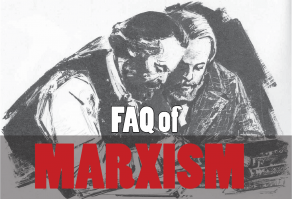Robert Mugabe’s departure on Tuesday, 21 November as president of Zimbabwe, after 37 years in office, has sent ripples throughout the southern African region. In Uganda it has brought out many of the underlying tensions beneath the surface of society.
Mugabe was hated throughout Africa, not only because he was a brutal ruler, but because he belongs to a trend of similar totalitarians who have oppressed the African masses for decades. His fall was met with jubilation throughout the continent, where the masses are sick and tired of the rotten old regimes. In Zimbabwe, Mozambique, Botswana and South Africa there were scenes of wild celebrations in the big centres. In South Africa, which has a large Zimbabwean immigrant community, the Johannesburg suburb of Hillbrow was turned into ‘mini-Harare’ as thousands danced in the streets.
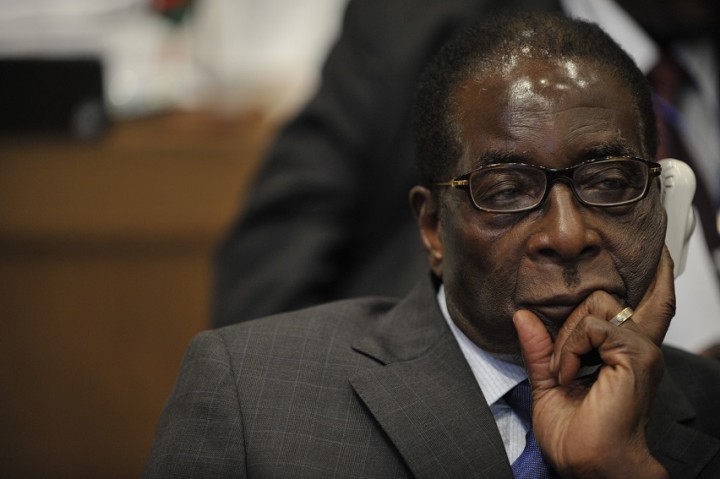 Robert Mugabe's resignation has sent shockwaves throughout southern Africa / Image: Jesse B. Awalt
Robert Mugabe's resignation has sent shockwaves throughout southern Africa / Image: Jesse B. Awalt
Mugabe was not removed by the Zimbabwean masses. His removal came as a consequence of contradictions at the top of the regime, which have intensified over years, and finally erupted into an open split. The struggles for resources, influence and power grew more and more intense towards the end of the 93-year old’s reign. These splits at the top ended in a coup. But in order to gain legitimacy for the the coup, the military clique then leaned on the mass movement of 18 November to push out the opposing faction and disguise their blatant power-grab.
However, having been called out on the streets, the masses are now venting years of frustration and anger. Celebrating the end of Mugabe, they will soon demand a reversal to years of corruption and oppression. In reality of course, nothing has fundamentally changed. Zimbabwe is still under the thumb of the old regime, which now continues without Mugabe.
The new president, Emmerson Mnangagwa is the other side of the coin to Mugabe. He has been a key player in Zimbabwean politics, at every turn during the last 40 years. Known as ‘the crocodile’ he is nothing but a bad replica of Mugabe. Soon the masses will realise this and as the euphoria evaporates, it will be replaced with disillusionment and then further anger. The army tops realise this and they have been trying to lead the whole process down a ‘constitutional’ channel. That is the basis for Mugabe’s farcical ‘resignation’. But no election or constitutional process can fill the stomachs of the people of Zimbabwe.
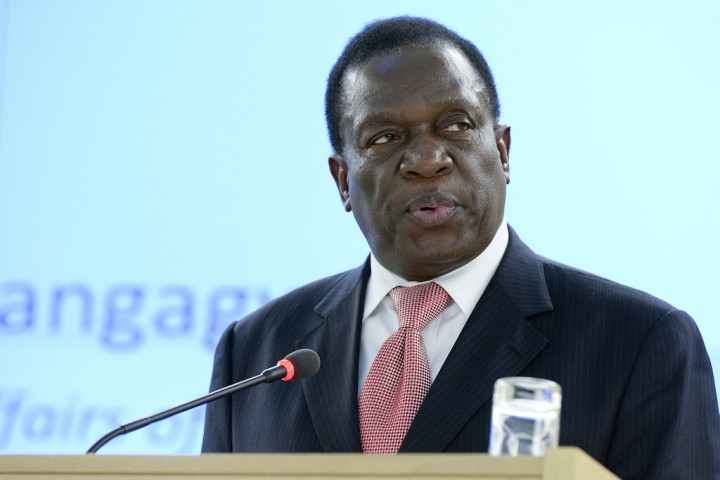 Emmerson Mnangagwa / Image: Jean Marc Ferré
Emmerson Mnangagwa / Image: Jean Marc Ferré
The new regime will not be able to calmly stabilise their rule in the near term. The splits at the top of the regime, which culminated in Mugabe’s removal, have aroused the masses from below. In Zimbabwe, and in fact in the whole of the Southern African, region workers, peasants and people have suddenly come to political life and they are now keenly following every event. This is causing great nervousness among the elites in the region.
Panic
The clearest example at this stage is Zimbabwe’s East Africa neighbour, Uganda. The regime of Yoweri Museveni is showing open signs of panic. When the coup broke out, Museveni revealed his paranoia by blasting the Zimbabwe Defence Force, calling the coup ‘unconstitutional.’ This is rich coming from somebody who rides roughshod over the Ugandan constitution.
Museveni has reason to worry. Mugabe’s fall is influencing events in Uganda where the masses now feel emboldened. The regime is clearly nervous about the events in Zimbabwe over the last few days and is moving to quell the mood on the streets.
One day after Mugabe’s ‘resignation’, Museveni promised housing and salary hikes for teachers, soldiers, healthcare workers and public servants. This announcement came as a shock to everyone. Earlier, Museveni stubbornly maintained that this was unaffordable due to the sluggish economy. Now, miraculously, the economic situation has improved to such an extent that he can start giving concessions! Of course, what he is trying to do is to make reforms from above, to avoid a revolution from below. But with the masses feeling stronger by the day, the reforms will only embolden them further.
Emboldened
Within hours of this announcement, other layers such as taxi drivers came out onto the streets. They have been waging a struggle against the Kampala Capital City Authority over the imposition of levies on taxi operators in the city. They blocked the road and even intercepted Museveni’s motorcade, demanding that he address them on the matter.
After a tense standoff with the special forces, and with the fear that things might get out of hand, Museveni was forced to intervene and made a short speech. Standing through the sunroof of his presidential vehicle, he told the taxi drivers that he was not in favour of the imposition of the levies and promised to attend to the matter urgently. A great cheer broke out. Satisfied with the answer, the taxi drivers opened the road and let the convoy through.
This is unprecedented! The very idea that people can block the Uganda’s presidential motorcade and make demands of the Ugandan ‘strongman’ is unheard-of. It is an indication that the masses are now losing their fear of the regime and feel emboldened by the events in their neighbouring country. From the point of view of the regime, this is a very dangerous situation. Once the masses sense the fear of the regime and it starts making concessions, it will embolden the people to press forward their demands.
Hanging on
The regime is clearly terrified. Several ministers and key allies of Museveni’s inner circle have warned the 73-year-old to abandon attempts to amend the constitution to abolish the age-limit of 75 years which barred him from extending his 31-year rule. Currently the age cap bars Museveni from standing in the country’s elections in 2021.
This issue has been simmering for months. It is deeply unpopular and is causing widespread resistance from ordinary Ugandans. A survey by Afrobarometer found that more than 60 percent is opposed the bill. To push the issue forward Museveni gave each Member of Parliament 8000 dollars “to facilitate a consultation with their constituents” on the bill.
This has sparked outrage among many working-class Ugandans. In a country where 27 percent of the people live on less than one dollar a day, this open corruption has caused furious scenes recently. There were several clashes with police when some MPs tried to promote the bill in their constituencies.
These pressures were felt in parliament. Some opposition MPs tried to block the tabling of the bill but were forcibly removed by a unit of the army. Although the issue is deeply unpopular, Museveni is ignoring his advisers and is plunging ahead stubbornly, calling MPs who opposed the bill ‘parasites’. Clearly these MPs are afraid of provoking the wrath of the masses, but backing down will leave Museveni humiliated. It would be the end of the ‘strongman’ image he has cultivated over the last 30 years and it will give more confidence to the movement on the streets.
Falling popularity
All of this is coming at a time when the whole regime is tainted by rising poverty, corruption and collapsing public services. While the poor get poorer, the rich get richer. Recently Museveni opened the oil-rich country up to looting under the disguise of ‘foreign investment’. French and Chinese oil companies have won lucrative contracts to pump 6.5 billion barrels of oil through a 3.5 billion dollar pipeline.
This is causing deep frustration throughout the country. At the latest Independence Day celebrations, which Museveni held in his home region, only a handful of people attended the event. In fact his bodyguards seemed to outnumber the crowds! It is a sign of his waning popularity even in the rural parts of the country, which have traditionally formed Museveni's support base.
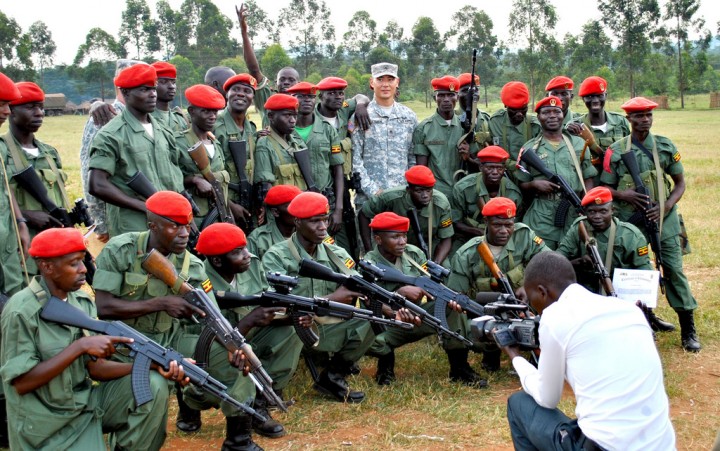 Ugandan military police / Image: Flickr, US Army Africa
Ugandan military police / Image: Flickr, US Army Africa
As his popularity support is falling, he is relying more and more on the military: especially the Special Forces Command, which he has turned into his loyal personal bodyguard. The unit was built on ethnic lines, comprising mainly of Museveni’s Hima ethnic group. The aim is clearly to sow ethnic divisions that he can use to stay in power. The unit is better paid than other army units, with better training and equipment. It was previously commanded by Museveni’s son, who is now a presidential adviser. A recent spike in brutality perpetrated by the security services is also a source of increasing resentment towards Museveni.
As is the case elsewhere on the continent, Museveni removed the special forces from the ordinary chain of command and put them under his direct control. At the same time, he also purged the old guard of the guerilla army and has surrounded himself with younger, less competent generals in a move to eliminate competition. But even here, the Zimbabwean situation ruffled some feathers. Clearly influenced by the Zimbabwean coup, which was led by the top commander of the military, Museveni shocked his own military by making a complete overhaul of the top command structure. He fired his own leading general and made 300 promotions to the chain of command a day after the formal downfall of Mugabe in Harare. This reveals his level of paranoia. But at the same time, in a similar manner as in Zimbabwe, the beginnings of a purge could bring out tensions from within the regime and deepen the political crisis.
The looming battle
In the 1980s Museveni hypocritically wrote: “The problems of Africa and Uganda in particular, are caused by leaders who overstay in power, which breeds impunity, promotes corruption and patronage.” Now, after 31 years in charge, he is moving to change the constitution to cling to office!
This is a situation which persists throughout Africa, where the old leaderships of the liberation movements have turned into rotten dictatorial regimes. The main problem lies in the fact that they all ended short of overthrowing the capitalist system after formal independence was won. Instead of overthrowing the system they became its managers on behalf of their imperialist masters.
Today many of the countries in the region are more dependent on the imperialist powers than when they were under their direct rule during the colonial era. Instead of direct, bureaucratic-military rule, the imperialists are dominating the region through debt dependency and the mechanisms of world trade, and through propping up totalitarian regimes to carry out the dirty work of keeping the masses in check.
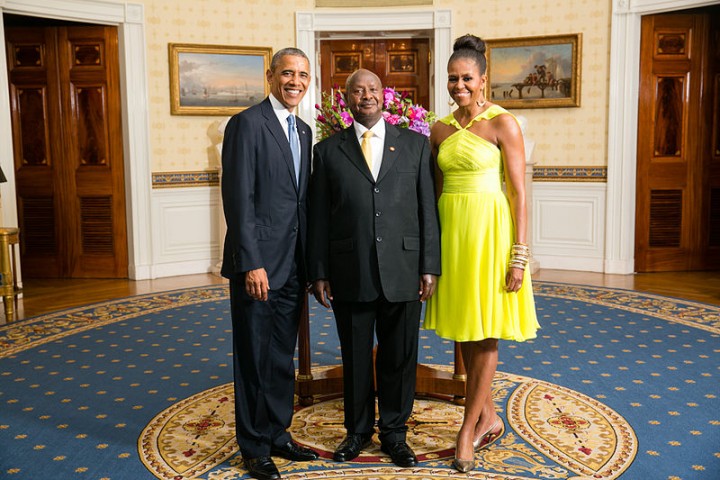 Yoweri Museveni with the Obamas / Image: Office of the White House, Amanda Lucidon
Yoweri Museveni with the Obamas / Image: Office of the White House, Amanda Lucidon
These regimes crystallized after the defeats and demoralisation of the 1980s and leaned on the weak economic booms of the 1990s and the 2000s. In the meantime, they have completely rotted from inside: sitting on power like a weak crust on a simmering volcano, never far from an eruption.
The parasitic Museveni regime is completely detached from the real society. Uganda has an extremely youthful population with an average age of 15 years. Most Ugandans were not even been born when Museveni came to power and they have no direct links to the liberation era.
There is also a huge difference between Museveni and his party, the NRM. Unlike ZANU-PF in Zimbabwe, the NRM does not have a big traditional social base. It hardly exists as an organisation and basically has no structures. It is really a machine that exists to keep Museveni and his cabal in power. The officials and the MPs are extremely dependent on patronage from Museveni himself.
The lack of political life in the ‘party’ has resulted in the situation where it cannot produce a successor. Museveni is now faced with his own succession problem. He needs time to promote his son. This is why he is pushing for the constitutional amendment.
But Museveni is running out of time. After 31 years of corruption, looting and crumbling infrastructure, the youthful population has had enough of him. The extreme centralisation of power in his own hands means he is now has become a focal point of all the accumulated anger in society.
Uganda is now a powderkeg waiting to explode. Just like the other strongman, Mugabe, Museveni and his clique are bound to be swept aside sooner or later. But as long as the capitalist system remains their will be no solutions to the problems of land, housing, healthcare, education and employment. Only on the basis of abolishing the capitalist system and spreading revolution throughout the continent and can these basic problems begin to be addressed.

